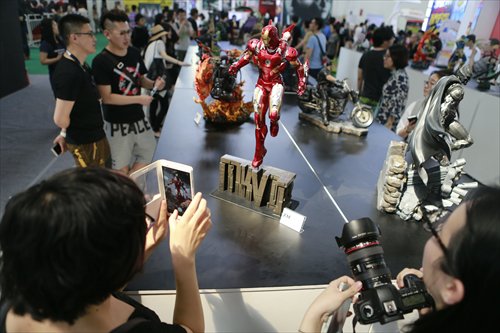
Fans take photos at the Beijing Comic Convention. (Photo: Li Hao /GT)
Just a quick look at cbooo.cn, a website that tracks Chinese mainland box office numbers, and you will find that more than half of the top 20 highest-earning imported films are either animated films or adaptations of U.S. comics, such as Zootopia, X-Men and Avengers. This is just one indication of a growing trend in the country - an increasing number of comic fans in China, where Japanese manga still holds a dominant position, are embracing U.S. comic book culture.
High box office records aside, the just finished Beijing Comic Convention (BJCC) is another example of the rising influence of U.S. pop culture.
Over the three-day Dragon Boat Festival holiday, the capital played host to this grand convention on comics. Organized by ReedPOP, the same organizer behind New York Comic Con, the two-day event attracted 16,117 participants who were willing to pay ticket prices between 180 to 1,900 yuan ($27-288) and travel to the city's suburban Shunyi district about an hour's drive from downtown Beijing.
'In the loop'
BJCC is not the first comic convention the team has brought to the mainland. A similar convention, the Shanghai Comic Convention (SHCC), was held in May of last year, with a second run coming in November.
Though U.S. comic book culture is on the rise, it is still too early to say if U.S. comics have moved into a dominate position - in fact, some still argue that it's not possible for U.S. comics to be as popular as Japanese manga in China.
For example, in an online article published on daily.zhihu.com, Wang Yan, a translator for some U.S. comics, wrote that while the most popular Japanese manga in China are those about pure romance, youth and hope, U.S. comics often deal with much deeper and heavier themes such as revolution, dictatorships, greed, death and betrayal, themes aimed at a smaller more mature audience.
However, in comic books' favor is the general rise of U.S. pop culture throughout China. An increasing amount of TV programs and films imported from the U.S. have become available in the Chinese mainland since the 2010s, leading to the audience for U.S. pop culture enlarging faster than ever before.
If her husband were not a fan of U.S. TV shows, 31-year-old Zhang Lin would never have traveled the long way from her home in the western part of Beijing to come to the convention.
"I was born in a small town in Zhejiang Province, so my childhood memories don't involve many things related to U.S. comic books," Zhang told the Global Times.
"There were Transformers toys, though they were boys' stuff. On the contrary, Japanese animated and live-action TV shows, such as Ikkyu the Little Monk, Slam Dunk and Super Sentai, were rather popular among both girls and boys."
However ever since Zhang graduated and began working in Beijing, she has found herself surrounded by U.S. pop culture.
"The films in theaters are X-Men, Captain America, Spider-man and Batman, while friends are talking about Game of Thrones, Agents of S.H.I.E.L.D. and now Warcraft. You really can't avoid paying attention to them if you want to stay in the loop," Zhang added.
Also an infrequent visitor to comic conventions, 23-year-old Sun Jing was very happy after attending BJCC, which she thinks helped make up for the lack of a qualified platform for U.S. comics in China.
Sun recalled that her first encounter with U.S. comic culture was a TV show about Superman.
"I was very little and saw this strange uncle rip off his clothes to reveal a costume," Sun said.
"Yet it wasn't until I was in college that I fell in love with comics."
Political pressures
A ReedPOP team member, Michael Chen pointed out that there was already a fanbase for U.S. comic book culture in China back in the early 2010s. Joining Reed Exhibitions in 2013, he explained that their U.S. team ReedPOP and its related products were brought to the mainland in 2014.
"We are targeting the expanding pop culture consumer demographic. Those who are willing to consume various authorized products with pop culture elements," Chen said.
Though he added that the group is not only focused on U.S. comics but also works from Japan, South Korea, Europe, Hong Kong, Taiwan and the Chinese mainland, "at the moment, the influence brought by Hollywood films is the most obvious… therefore, a larger percentage of the content and products provided at our convention are from the U.S."
While market forces seem to be the most influential factor behind these changes, political relationships may be a factor many overlook.
From the 1970s to the 1990s, Sino-Japanese ties were strong, yet they have entered a cold period since the 2000s.
Perhaps by coincidence, a smaller number of Japanese anime and TV shows have been imported into China in recent years.
Obvious or not, political factors have played a large role in influencing whether a film work or TV sh0w gets imported or promoted to a large audience. The recent Warcraft film was permitted to take over one of the most commercial areas in Beijing for its marketing, while few Japanese works seem to enjoy similar treatment nowadays.


















































